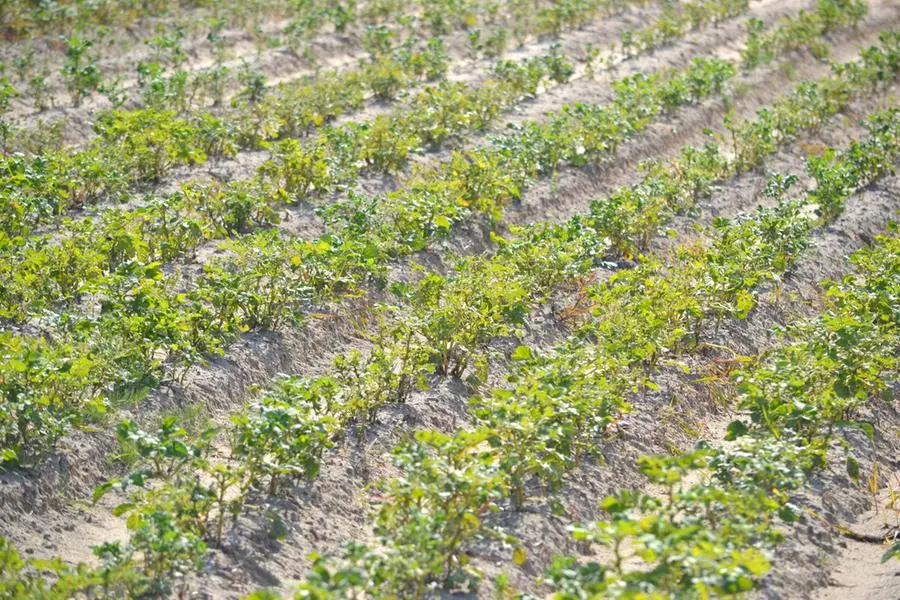PHOTO
Several African countries have adopted Genetically Modified (GM) crop farming and the number is expected to grow in the future.
But just how much are genetically modified organisms (GMOs) expected to shape the future of Sub-Saharan Africa’s agriculture? Joseph Maina explains.
Many of us have heard of genetically modified (GM) crops and how they are transforming agricultural production across the world. Here in Africa, several countries have adopted GM crop farming and the number is expected to grow in the future.
But just what are genetically modified organisms (GMOs), and how much are they expected to shape the future of Sub-Saharan Africa’s agriculture? Where does SSA stand in GMO farming, and how has the region benefited? Below is a catalog of points to help us better understand the roles and impact of GMOs in the region.
What are GMOs?
A genetically modified organism (GMO) is any organism whose genetic material has been altered using genetic engineering techniques. It could be an animal, plant, or microbe. It most commonly refers to organisms—often plants—that have been modified to achieve desired traits, like drought-tolerance and pest-resistance, using recombinant DNA techniques or genetic engineering.
Why are GM crops created?
It is important to note that biotechnology tools are used when the desired traits can’t be achieved through conventional plant breeding.
Are GM foods safe?
According to the World Health Organization (WHO), GM foods currently available on the international market have passed safety assessments and are not likely to present risks for human health.
There haven’t been any adverse effects on human health shown as a result of the consumption of such foods by the general population in the countries where they have been approved. The safety of GM foods is ensured through continuous application of safety assessments that include adequate post market monitoring.
What are some advantages of GM crop cultivation?
Farmers who grow GMO commodity crops, like soy and maize, do less tilling, which reduces topsoil loss, erosion, and the associated runoff of fertilizer. They also can cultivate pest-resistant GMO crops, like Bt cotton, corn, cowpea, and eggplant, with far fewer applications of pesticides, which benefits human and environmental health. Smallholder farmers in particular often report higher profits from GM crops due to better yields and less expenditure on inputs like pesticides and fertilizers. On average, GM crops have reduced chemical pesticide use by 37%, increased crop yields by 22%, and increased farmer profits by 68%. GE crops also have reduced CO2 emissions (mostly through enabling no-till farming practices) by 27 billion kg—equivalent to taking 12 million cars off the road for one year (Qaim et al. 2014).
Are GMOs suited for Africa?
Today many GMO crops are being bred in African countries by public sector scientists who are working to improve the nutritional content and viability of staple food crops key to their region, such as cassava, pulses, mustard, potatoes, rice, and bananas. Smallholder farmers typically grow these crops to feed their families.
How have African farmers benefitted from GMOs?
The farmers growing GMOs have obtained increased yields, reduced production costs and losses, and higher income.
Are there GM crops that have been approved in Sub-Saharan Africa?
Yes, a number of GM crops are already being produced in Ethiopia, Nigeria, Sudan, Kenya, Eswatini and South Africa. These include
- Insect-resistant (Bt) cowpea
- Insect-resistant and drought-tolerant TELA maize
- Insect-resistant, drought-tolerant and herbicide-tolerant maize
- Drought-tolerant maize
- Drought-tolerant canola
- Herbicide-tolerant canola
- Herbicide-tolerant soybeans
- Herbicide-tolerant rice
- Insect-resistant (Bt) cotton
- Insect-resistant and herbicide-tolerant cotton
Which GMOs are being developed in Sub-Saharan Africa?
A number of countries in SSA are involved in research that is expected to provide additional GM crops. These projects have the potential to deliver improved crops with improved nutritional value, increased pest and disease resistance, and improved salt and drought tolerance. The crops are undergoing research and development in Burkina Faso, Cameroon, Ethiopia, Ghana, Kenya, Malawi, Mozambique, Nigeria, Rwanda, Tanzania, Uganda. These include:
- Cassava resistant to mosaic virus and brown streak virus
- Virus Resistant Cassava for Africa (VIRCA)
- Vitamin-fortified cassava
- Vitamin A-fortified and bacterial wilt-resistant banana
- Potato resistant to late blight disease
- Drought-tolerant maize
- Drought-tolerant and insect-resistant TELA maize
- Water Efficient Maize for Africa (Drought-tolerant GM and conventional varieties)
- Nitrogen-Efficient, Water-Efficient & Salt-Tolerant (NEWEST) rice
- Vitamin A-fortified sorghum
- Vitamin A-fortified sweet potatoes
- Virus-resistant sweet potatoes
Do countries have control of GMOs within their jurisdictions?
Each nation exercises sovereign control over GMOs. They decide which GMOs can be developed and released to farmers, as well as which GM seeds and consumer products can be imported. Every country has the ability to establish its own biosafety regulatory agency to oversee GMOs and make its own laws governing their use.
Do farmers participate in GMO research?
Yes, GMOs are developed in collaboration with farmers, who share information about the traits they would like to see added to crops. They also participate in field trials to test the effectiveness of genetically engineered traits in a wide range of farm environments.
How easy is it for African farmers to access GMO seed?
Each country manages its own GMO seed production and distribution, primarily using local seed companies. Farmers can only access GM seeds that have been approved for commercial use by their government. Some GM crops are patented, so farmers are expected to pay for those seeds, just as they now pay for hybrid varieties. Other crops developed by the public sector are royalty free and available to farmers for free or low cost. Some GMO seeds can be effectively saved. Others should be obtained new each year, like hybrids, to ensure the vigor of their traits. In any case, farmers choose what they want to plant.
Copyright © 2022 AfricaBusiness.com - All materials can be used freely, indicating the origin AfricaBusiness.com Provided by SyndiGate Media Inc. (Syndigate.info).





















